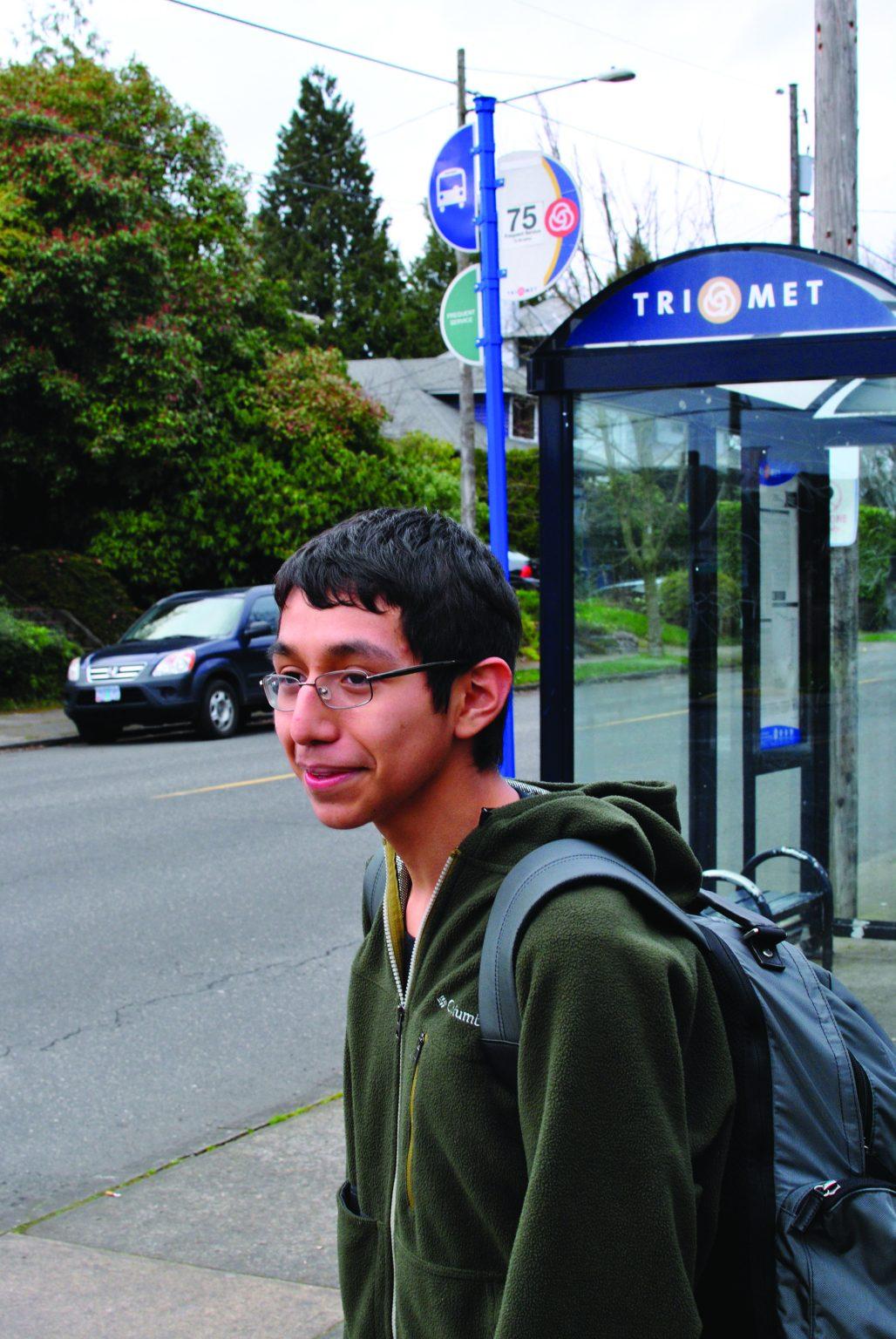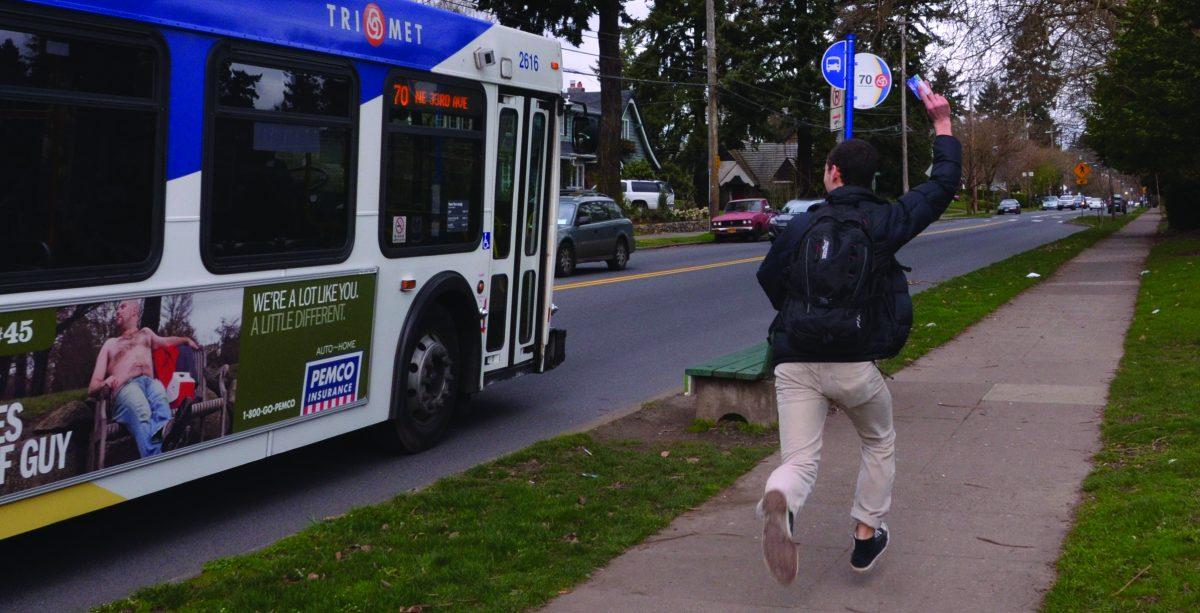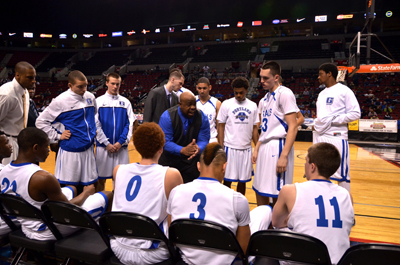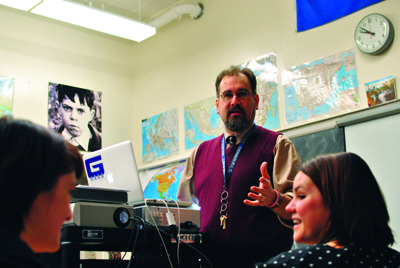Grant High School sophomore Raul Vega-Juarez stands at the corner of Northeast 15th Avenue and Dekum Street on a recent school day, patiently awaiting TriMet’s No. 75 bus. He strains against the weight of his backpack as the bus screeches to a stop.
Vega-Juarez hops on, flashes his student ID with the TriMet sticker and takes a seat. With his mom too busy with work to drive him, the pass makes it easy for him to get to and from school.
Sophomore Anne Miller stands in the cold weather outside the Dishman Community Center after swim practice ends. She looks at her phone to see a text from her mom: “sorry Anne, I can’t pick you up-have to work late.”
Instead of walking 20 blocks with her hair still wet from the pool, Miller boards the No. 8 bus, shows her student ID and heads home.
It’s a ritual that plays out for many Grant students who don’t have their own car or bike – using the student ID as a means of transportation. It’s a perk offered to students attending Portland Public Schools. But it’s something that could be on the chopping block for the next school year.
Funding for the bus passes comes from money chipped in by TriMet, the Portland school district and the city of Portland. But new Mayor Charlie Hales is proposing eliminating the city’s share for the bus passes as part of budget cuts.
“I’m disappointed that there might not be any bus passes next year,” says Vega-Juarez. “My mom will be very upset. I’ve taken the bus since sixth grade and it’s the only transportation I have.”
 According to the mayor’s office, the city is having a hard time coming up with its share because it faces a $25 million shortfall in its budget. Dana Haynes, the communications director for Hales, says all programs have to be looked at for cuts.
According to the mayor’s office, the city is having a hard time coming up with its share because it faces a $25 million shortfall in its budget. Dana Haynes, the communications director for Hales, says all programs have to be looked at for cuts.
He cautions that the decision hasn’t been made yet. “The budget line for bus passes hasn’t gone to the city yet. However, they have been brought up in discussion,” says Haynes.
If the passes are cut, many students at Grant and across the city would be left without transportation to and from school.
That worries Grant administrators. Principal Vivian Orlen understands the power of the bus pass. “No matter what socioeconomic a family is, the bus pass is really important,” Orlen says. “It gets kids to school but also helps students have an active role in Portland.”
Vega-Juarez’s mom works full-time, so she can’t drive him to school. Taking the bus with a pass makes things easier. He also runs on the track and field team at school and taking the bus home after practice helps out the family. He’s worried, though, about what will happen next year.
“I guess I’ll just have to learn to drive sooner,” Vega-Juarez jokes.
In reality he’d probably have to pay for the passes. “But those are really expensive,” he says, around $300 for the school year.
Driving isn’t a real possibility for Miller. “I have my permit but with two cars in my family and my parents both working, actually owning a car and a license doesn’t seem to be in my near future,” she says.
For her, riding TriMet isn’t just about the burden it takes off her parents. It’s a matter of independence. “It gives my parents a break but also because it gets me familiarized with the city and makes me become more independent,” says Miller, who is 15. “I’ve taken the bus since I was 11 and I rely on its simple and orderly transport. Taking this pass away will disrupt my orderly schedule. People don’t realize how much stress this will put on students and parents.”
For teachers, administrators and other staff at Grant, the bus passes play a vital role in student learning. “Not having the bus passes creates another additional stress for low-income families. It will be very disappointing if they’re taken away,” says Grant counselor Liz Mahlum. “Kids at Grant have come to rely on it quite a bit. It will really affect families.”
Grant student government is taking action in an attempt to help students like Vega-Juarez and Miller. Several students from both the sophomore and senior class councils are writing a proclamation with the help of Loretta Smith, the Multnomah County Commissioner of District 2, which covers Grant.
Smith spoke to the government class in an effort to get students involved. “I wanted to give them an opportunity to do something that we do at the county commission,” says Smith.
Sophomore vice president Annie Willis said Smith pushed students in her government class to help write a proclamation with other students to keep the passes. “The proclamation basically lists the reasons bus passes shouldn’t be cut and then has places for all of the Multnomah county commissioners to sign,” says Willis.
In an effort to gain more support from the commissioners, the group is also working on a testimonial video. “We’re asking students about how they use their bus pass and why it’s important,” says Camille Bales, sophomore class treasurer.
“Hopefully, when we’re all done with this, we can present it to the board and really make an impact,” says Gunnar Olson, sophomore class president.
 Dr. T Allen Bethel is the North and Northeast Portland representative on the TriMet Board of Directors. He says cutting funding for the passes would not only be inconvenient and costly for students but would also present a significant obstacle. It “will have some effect upon the students who are transit dependent for access to schools and may create an impassable barrier, causing them to withdraw from, or miss days of school,” Bethel says. “This will further add to the problem of education achievement and graduation rates.”
Dr. T Allen Bethel is the North and Northeast Portland representative on the TriMet Board of Directors. He says cutting funding for the passes would not only be inconvenient and costly for students but would also present a significant obstacle. It “will have some effect upon the students who are transit dependent for access to schools and may create an impassable barrier, causing them to withdraw from, or miss days of school,” Bethel says. “This will further add to the problem of education achievement and graduation rates.”
He called upon the city to commit its share. “For this partnership to work, the city and the school district, along with TriMet, must make their fair share of contributions,” Bethel said.
Jeff Cogen is the Multnomah County chair and a Grant parent. He understands the city is going through tough cuts this year. But he sympathizes with the students, including his daughter, who often rides the bus to school. “These passes have been identified as a valuable tool given to young people,” Cohen says. “I’m worried some students won’t be able to get to school.”
Vega-Juarez holds out some level of hope. It’s the best he can do. “Previously, people have attempted to persuade the city to not cut important programs. I’m hoping this time it works. The bus passes shouldn’t be cut,” he says.


































